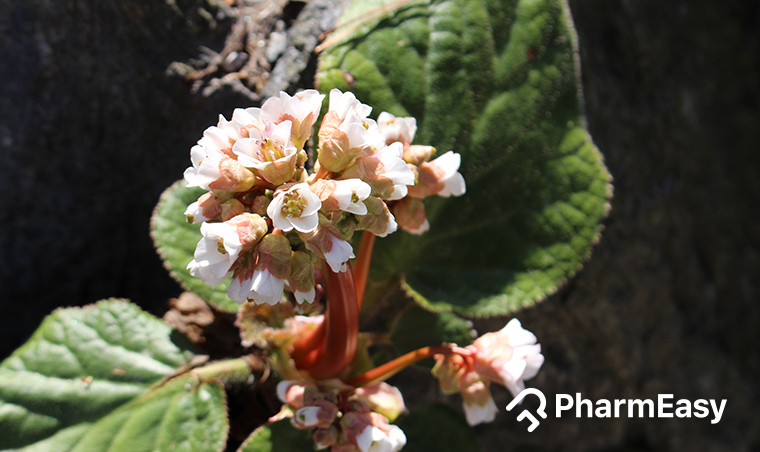Pashanbhed: Uses, Benefits, Side Effects & More!
By Dr Ashok Pal +2 more

Get,

to manage your symptom
Get your,


4 Cr+ families
benefitted

OTP sent to 9988776655



You’ve successfully subscribed to receive
doctor-approved tips on
Whatsapp

Get ready to feel your best.

Hi There,
Download the PharmEasy App now!!


Register to Avail the Offer
Send OTPBy continuing, you agree with our Privacy Policy and Terms and Conditions

Hi There,
Sign up on PharmEasy now!!
Trusted by 4 crore+ families

OTP sent to 9988776655



You have unlocked 25% off on medicines




Code: NU25
By Dr Ashok Pal +2 more
Table of Contents
Pashanbhed or stone breaker is a popular Indian drug. It is also called stonebreaker as it can dissolve kidney stones. Pashanbhed is derived from the plant Bergenia ligulata and is used in the indigenous system of medicine.
Bergenia ligulata is a climbing plant that is distributed in moist areas of the Himalayas, Bhutan, Afghanistan, Meghalaya, Arunachal Pradesh, Sikkim, and south Tibet.

The flowers of Bergenia ligulata are pink, purple, or white. According to the Ayurvedic system of medicine, Pashanbhed is used for various medicinal purposes. The rhizome, root, and leaves of Bergenia ligulata are used to treat a variety of ailments.1
The rhizome of Pashanbhed contains many chemical constituents like arbutin, paashaanolactone, afzelechin, bergenin, norbergenin, catechin, minerals, glucose, albumin, vitamins, mucilage, ash, starch, and gallic acid.
The constituents present in seeds of pashanbhed include tannic acid, coumarin, minerals, wax, coumarin, and gallic acid.
The root of pashanbhed showed the presence of tannins, alkaloids, flavonoids, steroids, terpenoids, carbohydrates, saponins, and glycosides.1
Did you know?
Pashanbhed is used in the management of kidney and bladder stones, urinary problems, and other diseases due to its medicinal properties like:
Did you know that Pashanbhed (Bergenia ligulata) contains a significant phenolic compound called ‘bergenin’ comprising approximately 0.9% of its composition? Along with bergenin, it also contains other phenolic compounds in smaller quantities. These compounds contribute to the potential health benefits and therapeutic properties associated with Pashanbhed.
Dr. Siddharth Gupta, B.A.M.S, M.D (Ayu)
Also Read: Isabgol – Uses, Benefits & Side Effects
Pashanbhed is available in two forms:
Some important formulations of Pashanbhed include Asmarihara kasaya churna, Mutravircaniya kasaya churna. The main preparations of Pashanbhed include Pashanbhed ghrit and Pashanbhed kwath.4,5
Your Ayurvedic physician will prescribe you the dose and form according to your medical condition.
In my experience, I have observed that Pashanbhed (Bergenia ligulata) has a distinctive aromatic odour and astringent taste. These sensory properties can be attributed to its chemical constituents, which interact with our taste receptors and olfactory receptors.
Dr. Rajeev Singh, BAMS
Also Read: Ragi – Uses, Nutrition, Benefits & Side Effects
Pashanbhed is an important constituent of many formulations used for managing kidney diseases. However, the acetone extract of rhizomes of Pashanbhed is known to be cardiotoxic in large doses and produces a depressing effect on the central nervous system. A large dose of Pashanbhed is known to produce antidiuretic effects too. However, it is unlikely that these effects will be observed with doses in the normal range.2
Also Read: Gokshura – Uses, Benefits & Precautions
Pashanbhed, also known as stone breaker, is a well-known Indian drug obtained from the plant Bergenia ligulata. This drug is known for its role in dissolving kidney stones.1
The common names of Pashanbhed include Pashana, Pashanbheda, Zakhmehayat, Asmaribheda, Ashmabhid, Ashmabhed, Shilabhed, Upalbhedak, Parwatbhed, and Nagabhid.1
The leaf juice of Pashanbhed is used for treating urinary troubles, haemorrhagic diseases, colds, epilepsy, and distension of the stomach.1
The roots of B.ligulata are used by tribes of Dharchula in Uttar Pradesh for the treatment of cuts, boils, ophthalmia, wounds, urinary complaints, and kidney stones. The root is also used by people in Johari (Jaipur) for the treatment of urinary problems and asthma. The rhizome of Pashanbhed is used by the Kumaoni tribes for managing fever. The root of Pashanbhed is used for the treatment of liver problems and tuberculosis. Pashanbhed plant is used by the tribes of the central Himalayan region for the management of dizziness, vertigo, and headache.1
The medicinal properties of Pashanbhed include antiviral, antiurolithic, free radical scavenging, antidiabetic, hepatoprotective, antipyretic, antitumor, antibacterial, anti-inflammatory, antifungal, and cardioprotective activities.2
The botanical name of pashanbhed is Bergenia ligulata. Some synonyms of Bergenia ligulata include Bergenia ciliata, Saxifraga ciliate, Saxifrage ligulata wall, and Saxifraga thysanodes lindl.2
No, Pashanbhed is also found in Pakistan, Nepal, Afghanistan, and China at greater altitudes.3
Pashanbhed grows well in temperate, humid climates, where the temperature is usually below 20 °C.5
Pashanbhed is cold in potency, bitter in taste, and helps cure prameha (urinary problems), dysuria, diseases of the female genital tract, and ulcers. In Ayurveda, the roots of Pashanbhed are known for their bitter, acid, laxative, and cooling properties, which are effective in the management of tridosha in tumours, calculi, urinary discharges, enlargement of spleen, dysentery, stones, and heart diseases.3
Also Read: Gulvel – Uses, Benefits & Side Effects
Also Read: Pink Himalayan Salt – Uses, Benefits & Side Effects
Disclaimer: The information provided here is for educational/awareness purposes only and is not intended to be a substitute for medical treatment by a healthcare professional and should not be relied upon to diagnose or treat any medical condition. The reader should consult a registered medical practitioner to determine the appropriateness of the information and before consuming any medication. PharmEasy does not provide any guarantee or warranty (express or implied) regarding the accuracy, adequacy, completeness, legality, reliability or usefulness of the information; and disclaims any liability arising thereof.
Links and product recommendations in the information provided here are advertisements of third-party products available on the website. PharmEasy does not make any representation on the accuracy or suitability of such products/services. Advertisements do not influence the editorial decisions or content. The information in this blog is subject to change without notice. The authors and administrators reserve the right to modify, add, or remove content without notification. It is your responsibility to review this disclaimer regularly for any changes.

Leave your comment...
Comments